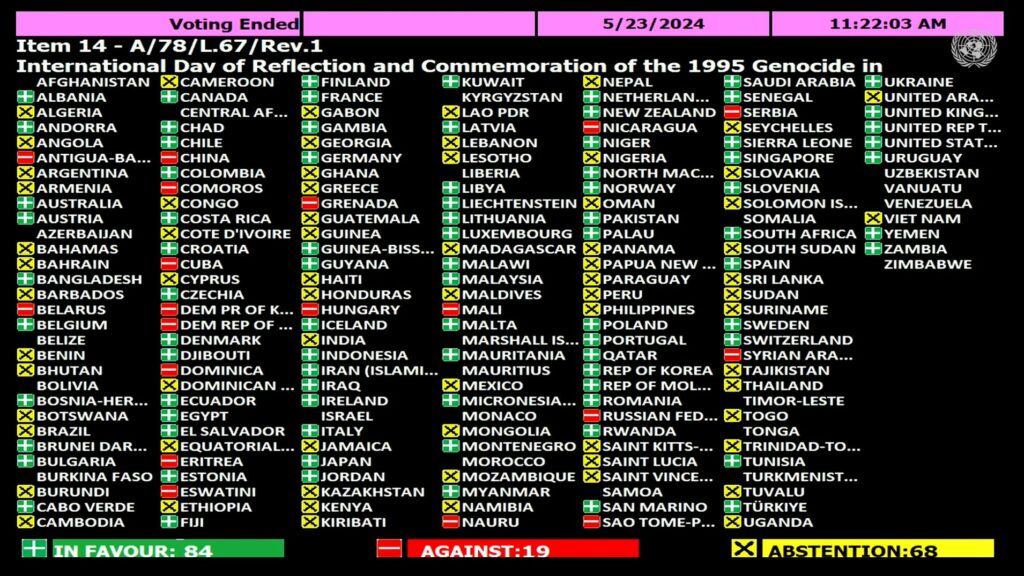The UN General Assembly adopted on Thursday a resolution designating 11 July as the “International Day of Reflection and Commemoration of the 1995 Genocide in Srebrenica” after a politicized debate and a vote with 84 countries in favour, 19 against and 68 abstentions.
China and Russia voted against. Among the EU member states, only Hungary voted against. Slovakia and Greece abstained, while the rest voted in favour.
Not surprisingly, EU candidate country Serbia voted against the resolution. The Serbian president, Aleksandar Vučić, pointed out in the debate that those found guilty have already been sentenced and that this was the first time that a vote on a resolution about genocide was not adopted unanimously in the General Assembly.
The resolution (document A/78/L.67/Rev.1) condemned any denial of the Srebrenica genocide as a historical event and actions that glorify those convicted of war crimes, crimes against humanity and genocide by international courts. It also requested the Secretary-General to establish an outreach programme titled “The Srebrenica Genocide and the United Nations” ahead of the 30th anniversary in 2025.
The new remembrance day on 11 July commemorates the massacre that started on 11 July 1995 in the town of Srebrenica. On that day, during the civil war in Bosnia-Herzegovina, Bosnian-Serb forces entered Srebrenica, a Muslim town which had been declared a “safe area” by the UN and was protected by a battalion of Dutch UN soldiers.
In the following days, the Muslim men were separated from the rest of the population and murdered by the Bosnian-Serb forces, while the UN soldiers, outnumbered and without the support of UN air strikes, were unable to prevent the massacre.
More than 8,372 Muslim men and boys were killed in a massacre that international courts would later define as genocide, the first one on European soil since the Holocaust in WWII. The resolution recalls the judgments of the International Tribunal for the Former Yugoslavia against those persons who were found guilty of the mass killing in Srebrenica.
The International Court of Justice in the Hague determined in February 2007 that the acts committed in Srebrenica constituted acts of genocide but did not hold Serbia responsible for them because of lack of evidence of a chain of command from the Serbian authorities to the Bosnian-Serb forces under the command of the convicted general Mladic.
The resolution reiterated that criminal accountability under international law for the crime of genocide is individualized and cannot be attributed to any ethnic, religious or other group or community as a whole.
The UN resolution does not mention UN’s own role in failing to prevent the massacre. A Dutch report published in 2002 concluded that the Dutch battalion of 200 lightly armed soldiers were sent to Srebrenica in an ill-conceived and virtually impossible peace mission, without adequate training and intelligence resources.
The responsibility for not deploying air strikes to save Srebrenica was a decision by UN and its military commanders in the region, according to the report.
As previously reported, when the EU commemorated the 25th anniversary of the genocide in Srebrenica, the prevailing mood in the countries involved in the war in Bosnia-Herzegovina in the 90-ies was still dominated by nationalistic narratives that prevented them from coming to terms with the past and engaging in a true reconciliation process, a condition for them joining the EU.
Asked to comment on the UN vote, Peter Stano, EU’s lead spokesperson for foreign affairs, replied that it was not for EU to comment on a vote in the UN of which it is not a member.
That said, he stressed that the EU has as very clear position. The EU rejects any denial of the Srebrenica genocide, which is a fact established by an international court. He has also said there is no place in the EU for any country which denies genocide.
M. Apelblat
The Brussels Times

